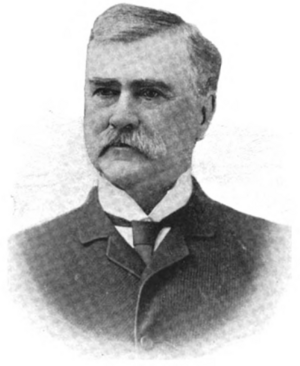Elisha W. McKinstry facts for kids
Quick facts for kids
Elisha Williams McKinstry
|
|
|---|---|
 |
|
| Associate Justice of the California Supreme Court | |
| In office January 5, 1874 – October 1, 1888 |
|
| Appointed by | Direct election |
| Preceded by | Isaac S. Belcher |
| Succeeded by | John D. Works |
| Assemblyman from Sacramento to the California State Assembly | |
| In office January 1, 1849 – December 31, 1850 |
|
| Appointed by | Direct election |
| Preceded by | Seat created by California Constitution of 1849 |
| Personal details | |
| Born | April 10, 1824 Detroit, Michigan, U.S. |
| Died | November 1, 1901 (aged 77) San Jose, California, U.S. |
| Political party | Democratic |
| Spouse |
Annie Hedges
(m. 1863) |
| Alma mater | Kenyon College (B.A.) |
Elisha Williams McKinstry (born April 10, 1824 – died November 1, 1901) was an important judge in California during the 1800s. He worked as a justice on the state's highest court, the California Supreme Court, from 1874 to 1888.
Contents
Early Life and Legal Training
Elisha McKinstry was born on April 10, 1824, in Detroit, Michigan. Later, he moved to Kinderhook, New York. There, he studied law by working with experienced lawyers. In 1847, he officially became a lawyer in New York.
Moving to California and Early Political Roles
In 1849, McKinstry traveled to California by steamship. This was a time of great change as California was becoming a state. He became a member of the first ever California State Assembly, representing the city of Sacramento.
In 1851, he started his own law office in Napa, California. The next year, in 1852, he was chosen to be a judge for the Seventh Judicial District Court. He served a six-year term and was re-elected in 1858.
Later Judicial and Political Career
McKinstry resigned from the district court in November 1862. In January 1863, he moved to Mono County, California, and continued his law practice. During the American Civil War, he ran for Lieutenant Governor in August 1863. He was nominated by the Copperhead Democratic Party but did not win the election.
After this, he moved to Nevada. There, he continued to practice law. He also ran for a seat on the Nevada Supreme Court but was not successful.
Becoming a Supreme Court Justice
In October 1867, McKinstry returned to California. He was elected as a county judge for San Francisco. His term was supposed to be four years. However, before it ended, he was elected as a judge for the 12th District Court.
In September 1873, he was chosen by the People's Independent Party. He was elected to the California Supreme Court on October 15, 1873. He served on this high court from January 1874 until October 1, 1888.
In 1879, California adopted a new state constitution. This meant new elections for all Supreme Court seats. McKinstry was re-elected, supported by both the Democratic Party and the Workingman's Party. The judges drew lots to decide how long their terms would be. McKinstry drew an 11-year term.
One important case he worked on was Lux v. Haggin. In this case, the court decided that riparian rights were important in California. These rights relate to how landowners can use water from nearby rivers or streams. He resigned from the court on October 1, 1888.
Life After the Court
After leaving his role as a judge, McKinstry became a law professor. From 1888 to 1895, he taught at the University of California's Hastings College of the Law in San Francisco. He also worked in private law practice with his son, James C. McKinstry. Later, he joined a law firm called Stanly, McKinstry, Bradley & McKinstry.
Elisha McKinstry passed away on November 1, 1901, in San Jose, California.
Achievements and Recognition
On December 20, 1899, McKinstry gave a special speech. This was at the Jubilee Celebration in San Jose, California. The event celebrated 50 years of California being a state.
He also received an honorary Doctor of Law (LL.D.) degree. This special award came from the University of Michigan.
Community Involvement
McKinstry was the president of the Society of California Pioneers. This group celebrates the early settlers of California.
Family Life
Elisha McKinstry married Annie L. Hedges on July 27, 1863. Their wedding took place in Marysville, California. They had four children together: two sons named Charles H. McKinstry and James C. McKinstry, and two daughters named Laura L. McKinstry and Frances McKinstry.

